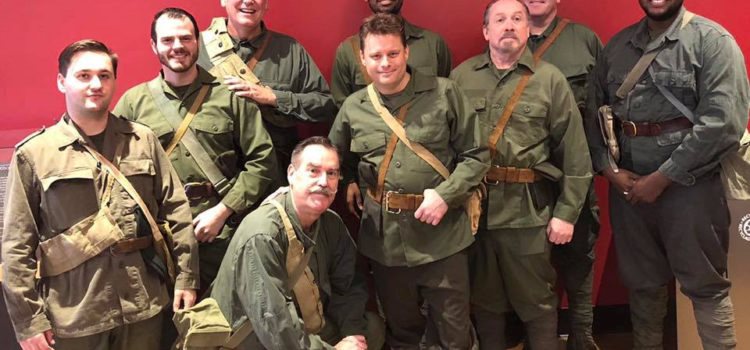By Andrea Braun
Contributing Writer“Last night I had the strangest dream I ever had before. I dreamed that men had all agreed to put an end to war.” –Chad Mitchell Trio
Entering Kyra Bishop’s set feels much like walking onto a battlefield. It is dark and dreary, no color to speak of, just browns and grays all around. There are rolls of copper wire, downed trees, and a backdrop so primitive it is held up by rope. Then, in the distance a man is singing a traditional Scottish ballad, “Will ye go to Flanders?” Gradually other voices join him and nine soldiers enter. It is 1914 at Christmas, and these guys are already tired of the fighting and their voices reflect that sense of weariness, of hopelessness.
But what they also demonstrate is a remarkable ability to sing solo, in ensembles or all together. This is the fourth production of “All Is Calm” that Mustard Seed has mounted since its premiere in 2012, the third one I’ve seen, and the strongest yet.
The ensemble changes, though five of the cast members have appeared in the show at least a couple of other times. What is remarkable is that whoever is in front of us is fully believable, invested in the roles, and able to bring off every single number in the show from the sublime to the silly.
I couldn’t single out any cast members because they were all so good; here they are in alphabetical order: Kent Coffel, Anthony Heinmann, Christopher Hickey, Greg Lhamon, Gerry Love, Michael Lowe, Sean Michael, Abraham Shaw, Jeff Wright
The center of the story is a real event. On a memorable night in the first year of World War I, the British and Irish and the Germans stopped fighting. Just like that. They had been in mortal combat for days, perhaps weeks, and while they don’t exactly beat their swords into plowshares, they spend a night burying their dead together, playing soccer with each other, decorating a tiny Christmas tree, and most of all, singing the holiday songs of their cultures.
Besides song, the men recite quotations from soldiers’ letters, from the Pope and Winston Churchill, and most moving, two of the so-called “War Poets,” Wilfred Owen and Siegfried Sassoon. These young men created a body of literature about the war experience, and there is nothing romantic about it, nothing “sweet and right” about dying for one’s country, as Owen expresses in his ironically titled “Dulce et Decorum est,” about a slow and horrible death from mustard gas. All these statements give the audience a sense of how the troops from the lowliest private to the prime minister were feeling about the job at hand. So, why did they do it?
Because they were called to duty. Because patriotism motivates both sides in war. And, probably not least because they could be hanged for treason if they ran away. But there is also a sense of real camaraderie here, not only on one’s own side, but among all the men—perhaps more accurately boys—who have been called to kill the other side who look just like them. The Royal Family is 100 percent German, for example. They just changed their names from Saxe, Coburg and Gotha to Windsor. Done and dusted. It wasn’t so easy for the young men who had to take sides, however.
Lighting design is a character too. Generally, the lighting designer does the job by not being particularly notable, but here, the light literally brings life, especially in the Christmas tree scene wherein “Silent Night” begins in a minor key when the tree comes out, then as the lights gradually go up, the song becomes harmonic. Credit goes to Michael Sullivan.
Jane Sullivan and Zoe Sullivan handle costumes and sound respectively and with their usual expertise. Director Deanna Jent and Musical Director Joe Schoen keep everything moving, and in its fifth production, the show works like a well-oiled machine.
“All Is Calm” is by Peter Rothstein, with musical arrangements by Erick Lichte and Timothy C. Takach. Its history is fascinating, having had its public debut on Minnesota Public Radio. Jent notes that: “While not shying away from the horrors of war, it presents a moment of hope that seems to have been transformative for the men involved in the event.”
In only six years since All Is Calm was first presented, our country seems to have gone to war with itself. May the peace among a group of people whose immediate “job” is to kill the “enemy,” serve as an example of the way we might all treat each other and perhaps even someday agree “to put an end to war.”
“All Is Calm” will run through Dec. 16 at the Fontbonne University Fine Arts Theatre. Details are available at www.mustardseedtheatre.com.

Lynn (Zipfel) Venhaus has had a continuous byline in St. Louis metro region publications since 1978. She writes features and news for Belleville News-Democrat and contributes to St. Louis magazine and other publications.
She is a Rotten Tomatoes-approved film critic, currently reviews films for Webster-Kirkwood Times and KTRS Radio, covers entertainment for PopLifeSTL.com and co-hosts podcast PopLifeSTL.com…Presents.
She is a member of Critics Choice Association, where she serves on the women’s and marketing committees; Alliance of Women Film Journalists; and on the board of the St. Louis Film Critics Association. She is a founding and board member of the St. Louis Theater Circle.
She is retired from teaching journalism/media as an adjunct college instructor.

